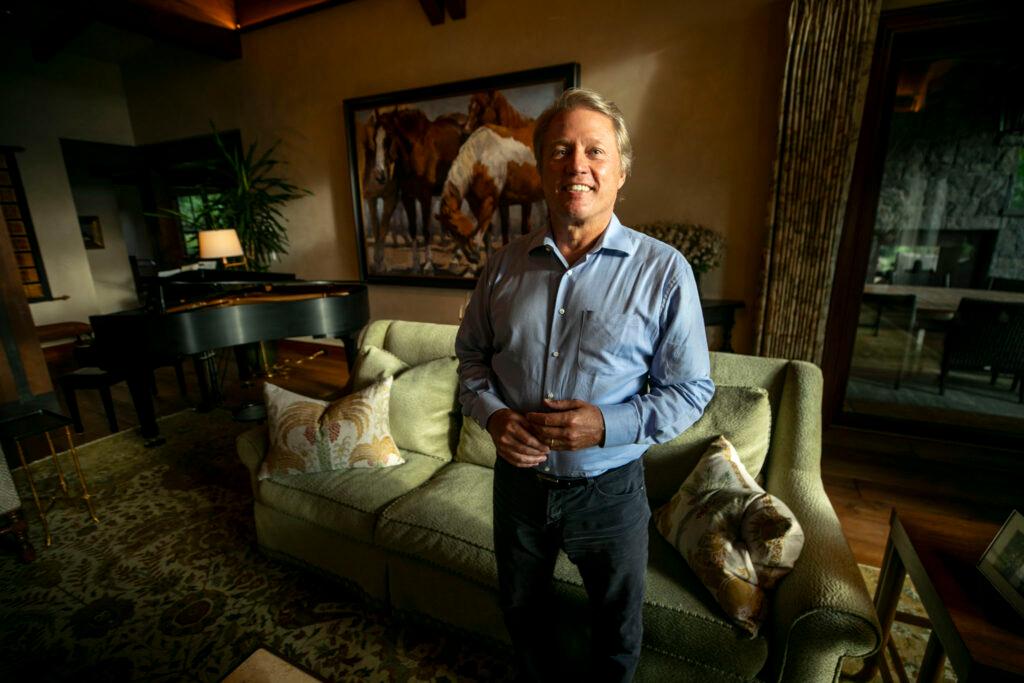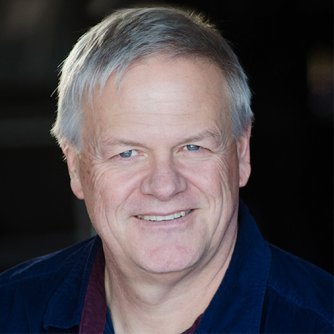
Kent Thiry has wanted to run for elected office since he was 10 years old.
That ambition has been obvious throughout his life. While he’s best known for his controversial decades as the CEO of the health care company DaVita, Thiry has also built a vast political network, spent millions on political causes, and flirted with a run for governor.
But today, he says, his dream of leading Colorado’s government has ended.
During a recent interview at his mansion in Cherry Hills Village, Thiry said he would not run for the state’s highest office, and didn't plan to campaign for any others. I asked him if that decision pained him.
“A little bit,” he responded bluntly, letting silence hang for a few seconds afterward.
While a run for Colorado governor may not be in Thiry’s plans, he instead is focusing his substantial power and money on a years-long campaign to change how politics works in the West.
“The data is pretty clear that my highest and best use is to do what I'm doing — to work on initiatives that hopefully make a contribution for the next generation,” said Thiry, who studied political science and history at Stanford University as an undergraduate and later completed an MBA at Harvard Business School.
The wealthy businessman has been one of the biggest individual spenders on Colorado politics in recent years, and almost all of that money has gone toward a series of sweeping and successful ballot measures that have significantly changed the rules of the state’s elections.
Letting unaffiliated voters participate in party primaries? That was a Thiry campaign. Replacing in-person presidential caucuses with a public vote? Thiry’s thing. Creating an independent commission to prevent gerrymandering? Ultimately, that was Thiry, too.
This year, he and his allies are putting forward their biggest idea yet. They are spending millions on Initiative 310, which would eliminate party-based primary elections, and move general elections to ranked-choice voting, for many Colorado races.
Through these proposed changes, Thiry aims to disempower the political fringes and, he says, encourage bipartisanship. But his opponents see this year’s initiative in starker terms: One critic said the measure will “decapitate” the state’s political parties.
Republicans complain Initiative 310 will end up “rigging” elections, while Democrats warn it could clear the way for billionaires to further dominate politics. Election officials worry that it will introduce unnecessary complexity and create additional mistrust at a time when the system needs all the public faith it can get.
“We run the best elections in the country,” said Molly Fitzpatrick, clerk and recorder for Boulder County. “That’s why we need him to take these concerns seriously.”
How Initiative 310 would change Colorado’s elections for Congress and state offices
- No more primary elections for Democrats, Republicans and other parties. Instead of having each party pick its own candidate for the general election, everyone in a given race would be placed on the same primary ballot. The top four vote-getters would move on to the general election. This system would allow for unusual outcomes, such as multiple members of the same party facing off in November, or a major party failing to get any of its candidates into the general election at all.
- Ranked-choice voting for general elections. Ahead of the November election, voters would get a ballot listing the four candidates. Instead of selecting just one, voters would rank some or all of them in order of preference. All voters' rankings would be combined in a mathematical process to determine the winner. This version of RCV is also known as “instant runoff voting.”
This isn’t just Colorado; Thiry and other wealthy donors have a national strategy
This election effort goes far beyond Colorado's rectangular borders. Thiry is part of a network of wealthy people who are backing similar campaigns this year in Nevada, Idaho, Oregon and Montana. They already helped pass a similar law in Alaska and supported a failed effort in Massachusetts.
More than $50 million has been spent on this coordinated, multi-state effort so far, with around $38 million of that amount coming from just 50 donors, according to a CPR News anaylsis.
The state campaigns also share advertising ideas, data, legal strategies and more. Much of that work happens through nonprofits like Unite America, which Thiry joined as a co-chair in 2021.
Other prominent members of the network include the food production heiress Katherine Gehl; the “radical centrist” and climate activist Kathryn Murdoch, who is a daughter-in-law to Rupert Murdoch; and Kenneth Griffin, founder of the multibillion-dollar hedge fund Citadel.
The coalition has spent well more than $20 million on the Nevada campaign, overwhelming the establishment opposition by a 10-to-1 margin.
Thiry says the price tag is a bargain: For just a fraction of what’s spent on a typical U.S. Senate campaign, these donors hope to permanently change election systems in multiple Western states.
If things go according to plan, Thiry hope this year’s initiatives will be the pebbles that kick off an avalanche, building support for the idea nationwide.
“There's a lot of people around the country that are rooting for us,” he said. “Because if we win, they're going to have momentum in their state.”

Thiry presents himself as a reformer for American ideals of democracy. He can recite the Gettysburg Address from heart, and teared up doing so for a journalist.
But to his detractors, he wants to make Colorado a guinea pig for ideas that are untested at best, and destabilizing at worst.
“I think wealthy people like Kent Thiry see Colorado as an opportunity because we're seen as sort of one of the bellwether states,” said Ellen Dumm, a consultant for the No on 310 campaign and a longtime Colorado elections expert. “Because we're not huge, we don't have a lot of media markets, and they can pour some money into it and figure out if things work.”
Thiry is far from the richest man in Colorado, and he is not the wealthiest player in state politics, but he has proved remarkably adept at putting his money behind ideas at just the right time.
“In a certain sense, this will be his legacy,” said Christine Scanlan, a former Democratic state lawmaker and longtime politico. “Certainly in our state, there's been such tremendous impacts from a number of these initiatives that have passed, and I think he could be both credited for that and recognized as an instrument of change.”
With this campaign, Thiry has made a lot of enemies, including some former allies
Thiry’s critics on the left have portrayed his agenda as a plutocratic takeover attempt.
They argue that by disempowering the political parties and their grassroots bases, Thiry wants to make it easier for money to dominate the process. He dismisses the charge as "ridiculous," considering the parties themselves are spending "stunning" amounts on every election.
On the right, his critics simply call the reforms a “scam,” saying ranked choice voting is convoluted and deceptive. And still, others, including some election officials, complain that Thiry is pushing the state too far and too fast toward changes that may not be needed.
They also question his credibility, pointing to the $1 billion in settlements paid out by DaVita during and after his tenure as CEO, which ended in 2019, as well as a criminal antitrust trial in which he was found not guilty. (Thiry says the prosecution was misguided, and that the settlements included no acknowledgment of wrongdoing.)
“Why is he doing this?” asked Dumm. “Colorado does not have an issue. Why do you want to do this so fast?”

Meanwhile, the emergence of Thiry and company's national movement is inspiring a counter-revolt in more conservative parts of the country, with 10 states banning ranked-choice voting altogether. In Colorado, a conservative-backed effort to put an anti-ranked choice voting amendment on the November ballot failed to collect enough signatures.
Thiry, who likes to pump both fists when he makes his points, says his true mission is fixing the two-party system, not destroying it.
“The irony of all this is that both parties brutally and bitterly attack us, when in fact,” he said, “if we implement this, it could save them.”
Thiry turned to election reform out of frustration
Thiry’s original philanthropic interests were in education and the environment, but time and again, he ran into Congressional gridlock. His turn toward democratic overhaul began, he said, with conversations with now-Sen. John Hickenlooper in the 2000s, when Hickenlooper was mayor of Denver.
“We would stare at what was going on in the country we love … and kick ideas around about what is practical and feasible, but yet powerful,” he said.
Thiry was disgusted by Congressional Republicans’ obstruction of a bipartisan bill to address the budget deficit in 2010 and of the failure of the Gang of Eight immigration reforms in 2013. Thiry is unaffiliated, but he has at times been registered as a Republican, and he considered running for governor as a Republican in the 2018 election.
Those early conversations with Hickenlooper, a Democrat, started to yield a plan. “We knew it was going to take multiple steps. There was no silver bullet,” Thiry said.
A spokesman for Hickenlooper did not respond to a question about his involvement with Thiry. But Scanlan, a former legislative director for Hickenlooper when he was governor, described the two men as personal friends who share much of the same philosophy about governing.

Thiry’s first step, approved by voters in 2016, was an effort to open up how the state picks candidates. The ‘Let Colorado Vote’ initiatives eliminated in-person caucuses for presidential nominations in favor of primaries and opened all state primaries to unaffiliated voters.
“One of our core principles is that every eligible American voter in a taxpayer-funded election should get to vote for whoever they want. And the parties should not be able to limit that,” he said
Those early changes contributed to the rise of unaffiliated voters, with growing numbers of people in the state refusing to formally identify with any party.
“I think he tapped into that energy,” Scanlan said.
Thiry and his political allies returned in 2018 with a push to create new constitutional protections against gerrymandering. Instead of potentially allowing politicians to draw election maps in their favor, they wanted to put the task in the hands of an independent redistricting commission.
On the surface, the idea appeared remarkably popular with politicians at the statehouse. But behind the scenes, the impetus for that show of unity was Thiry’s money. He had threatened to spend millions of dollars to put the idea on the ballot himself.
Initially, Democrats resisted the idea of a commission. They had concerns about the details of the measure, worrying that Thiry's original proposal would make a mess. As a party, they would also be giving up an advantage in the next drawing of the maps in 2021.
But ultimately, instead of fighting Thiry, lawmakers in both parties joined together in unanimous votes to put constitutional amendments on the ballot. Dumm, the campaign consultant who’s now opposing Thiry on Initiative 310, worked with him on that effort, which eventually passed with more than 70 percent approval on the ballot.
“He would assemble us from time to time at his house in Cherry Hills [Village]. We got to see his musketeers outfit in his basement in a glass case,” she said, referring to the comical outfit that Thiry would wear to rally the corporate workforce at DaVita.

The creation of the redistricting commission was another demonstration of Thiry’s style. He has enough money to run any ballot initiative he wants, and he has a track record of getting them passed. So when Kent Thiry has an idea, people listen.
“He knows every person in town,” Dumm said. “Whether or not they like him is another thing.”
His critics, including prominent elections officials, see Thiry as a bull in a china shop, throwing around his weight and leaving others to clean up the mess, whether it’s by revising his proposals or hitting his aggressive timelines.
“It seems like when you get to a certain place, financially … you can just snap your fingers and think it gets done that easily,” said Matt Crane, a former Republican county clerk and the executive director of the Colorado County Clerks Association. “And that's certainly not the case” with election system changes, he added.
Amber McReynolds, a national elections expert and a consultant to Thiry, describes the businessman as receptive to criticism.
“He doesn’t come and say ‘It shall be like this,’ but it’s really a seeking of thoughts and perspectives and ideas and really deliberating on those,’” McReynolds said.
She said that he originally wanted Initiative 310 to be a constitutional amendment, but switched it to a law change at her suggestion. That means, if the measure passes, the legislature will have the power to change it. State lawmakers are already using their power to try to contain Thiry's ambitions: They passed a law that could block the implementation of Initiative 310 altogether.
Still, there’s no sign that Thiry is slowing down. He argues that the state has already implemented previous changes like mail-in voting and open primaries “with flying colors.”
Thiry says he regularly hears from everyday people, and even partisan politicians, who agree with his mission. Early research in Alaska found support for that state's new system from voters across the political spectrum.
“There aren't that many great democracies that have survived more than a couple hundred years. And in order to survive, you have to modernize and modify and reflect society,” Thiry said.
But at the same time, early research has also found that ranked-choice voting can cause greater rates of errors by voters. In Maine, an MIT researcher found that voters were uncertain and unsatisfied by a new ranked-choice system. And whether proposals like this can really achieve Thiry’s stated goals remains an open question.
Colorado state officials are currently reviewing the hundreds of thousands of signatures submitted to put Initiative 310 on the ballot this November.









